- Home
- Parnell Hall
Cozy (Stanley Hastings Mystery, #14) Page 2
Cozy (Stanley Hastings Mystery, #14) Read online
Page 2
A sharp, slapping sound.
And a scream.
Not a long scream. Just a short, high-pitched cry of surprise and pain.
All heads turned at once.
Saw nothing.
The sound had come from somewhere off in the woods.
“What was that?” the woman said.
“I don’t know.”
“It sounded like someone got slapped,” Alice said.
“Yeah, maybe,” I said. “Should we go see?”
Alice looked at me. “Don’t be silly. It’s nothing. You hear anything now?”
No, I didn’t. But whatever it was was not nothing. Someone had certainly screamed. I craned my neck, continued to look around.
For a second I thought I saw something through the trees. A flash of color, like someone’s clothes. But I couldn’t even say what color it was. Is that strange, to see it and not know? Because that’s all it was, just the impression of someone moving through the leaves. I squinted my eyes, trying to pick it up again, and—
I was shocked back to earth by a warm, wet sensation on my cheek, and the sound of laughter.
Alice and the woman were laughing at the sight of me being slobbered on as I got my face licked by the large, sandwich-eating dog.
3.
IT WAS MUCH easier going down. Which nearly restored my faith in hiking. Going up was an ordeal, but going down, hey, you had gravity in your corner. Just point your feet in the right direction, and let nature take its course. I found myself not only keeping up with Alice, but actually skipping on ahead.
“Take it easy,” Alice said. “It’s not a race.”
Unbelievable, after the way she’d gone pelting up this same path.
“What’s the matter?” I said. “Can’t you keep up?”
“You’re gonna twist your ankle. If you twist your ankle, there goes the whole vacation.”
“I’m not gonna twist my ankle.”
“You are if you don’t look where you’re going.”
“I’m looking where I’m going.”
“No, you’re not. You’re looking back at me.”
“Only because you’re talking to me,” I said.
But, as usual, with Alice, I knew better than to argue. I stopped, let her catch up.
“Take it easy,” she said. “He’s not chasing you.”
I blinked. “I am not running away from the dog.”
Alice smiled. “You looked just adorable.”
“I know, I know. I made your day.”
“He was a very sweet dog.”
“Wonderful. I’m sorry he couldn’t have licked your face too.”
“I didn’t give him my sandwich.”
“Right. He knew a sucker when he saw one. Well, I’m pushing off. Would you like a head start, or do you think you can keep up?”
“Don’t be a jerk,” Alice said. “Just watch where you’re going and don’t get hurt. I don’t want to spend the whole vacation with you laid up in bed.”
We continued down the path at what was a moderate pace compared to what I’d been doing, but was greased lightning compared to our pace coming up.
Speaking of which, we passed a number of people who were on their way up, and I could not help feeling smugly superior. After all, I had survived the climb, and was on my way down. And, whether it’s psychological or not, I have to tell you, on the way up the people who passed us coming down looked happy, whereas on the way down, the people who passed us going up did not look pleased at all.
I had one other observation I was somewhat amused to find true. In whatever group of people it was that passed us, the grumpiest person was always the adult male. The father, the husband, the boyfriend, whatever. In a family, it was always dear old dad. Unless, of course, Grandpa was there to outgrump him.
But by far, the grumpiest of all was a man who came up alone. He was overweight, and clearly out of shape, huffing and puffing at every step. His bald head glistened with sweat. His shirt was soaked clean through. His shorts had slipped well below his waist, and appeared to be just on the verge of tripping him. He looked angry enough to bite someone’s head off.
“See,” I said, after he went by, “I am not the world’s worst hiker. I am actually pretty damn good.”
Alice shook her head. “Sorry,” she said. “You score no points at all.”
I blinked. “What?”
“That man is alone. No one made him go up the mountain. He’s doing it on his own. You, on the other hand, had to be dragged. That man can bitch and moan all he wants about how terrible it is, but the fact remains he’s a volunteer.”
“Just because no one’s with him doesn’t mean no one made him do it,” I said.
Alice cocked her head. “Are you saying I made you do it?”
And there I was again. She was the one saying nobody made him do it. It was her premise, not mine. I was an innocent bystander, just trying to hold up my end of the conversation. And suddenly there I was on the hook again.
“Well, for whatever reason he’s going up the mountain,” I said, “he certainly seemed unhappy.”
Before Alice could point out that I’d deflected the question, I said, “Hey, look there.”
“What is it?”
“Down there on the path.”
“I don’t see anything on the path. What are you talking about?”
“I don’t mean on the path. Beside it.”
“Stanley.”
“It’s the rock.”
“What?”
“The big rock with the tree growing on top of it.”
“Where?”
“Right there. That’s the one in the guidebook.”
It certainly was. I whipped out the guidebook, read the description again to make sure.
“That’s it, all right,” I said. “That’s great.”
“What’s great about it?”
“Are you kidding. Look at this map. If that’s this rock, we’re almost back to the road. We made it down in no time.”
“I told you you were going too fast.”
“Come on. Let’s see if it is.”
We made our way down the path to what had to be the big rock with the tree growing out of it mentioned in the guidebook. When we got closer, I saw how we’d missed it on the way up. From nearby, you don’t see the tree. You have to be farther away, and you have to be looking for it. We had already passed by before I noticed it in the guidebook.
I stood next to it, admiring its beauty, and congratulating myself on how quickly we’d gotten down the mountain.
There came a muffled sound from the other side of the rock. Sort of a stifled, half sob.
Alice and I both heard it. We looked at each other, shrugged. I gave a shall-we-walk-by-the-rock gesture, which Alice and I proceeded to do.
Standing in the trees at the far end of the rock was the girl. The blond girl with the backpack from the Swedish brochure who’d passed us on the way up. Somehow or other she’d managed to pass us again and get back down. She’d also lost her blond boyfriend along the way.
Which might have accounted for her mood. Her face was caked with tears, and it was obviously her sob we had heard.
She saw us, and immediately turned her head and took a few steps away.
I looked inquisitively at Alice.
She murmured, “Leave her alone,” took me by the arm, and led me away, as if I’d been about to intervene. Which isn’t in my nature—a stranger’s private business is their own.
Alice, on the other hand, might have jumped in, had it been anyone less attractive. That’s not fair. I’m sure Alice would have offered aid. had it been appropriate.
Anyway, we went on by as if we didn’t see her, and continued on down the path.
I felt bad.
No, not that we didn’t help her—my personal opinion is the most help you can be to someone who’s upset is to leave them alone. I felt bad for how I felt. I mean the moment I saw her. Saw her crying, that is.
Beca
use I felt good. A sudden flash of elation. It was momentarily, fleeting, immediately gone. But there it was. The least admirable of all emotions, yet one’s own.
It’s hard to explain. You had to be there. You also had to be me. A middle-aged married man, incapable of winning an argument with his wife, climbing a mountain he didn’t really want to climb, and being slapped in the face with the realization of just how old and out of shape he actually was.
And watching the young, perfect couple go scampering up the slope without a care in the world.
It reminded me of the scene in Kurt Vonnegut’s Sirens of Titan where Rumfoord shows Malachi Constant a painting of his wife as a little girl, dressed entirely in white, the cleanest, most frozen little girl Malachi had ever seen, and Rumfoord says, “Wouldn’t it be too bad if she fell into a mud puddle?” which startles Malachi who had just been thinking she looked as if she were afraid of getting dirty.
I realize the example isn’t as great as I thought it was. The two young backpackers didn’t look like they were afraid of anything. What I’m getting at is, they were so clean, fresh, young, carefree, that you almost wanted to strangle them. At least to say, “Excuse me, you can’t go scampering up the mountain so gleefully with wild abandon. There is such a thing as real life, with limits and consequences and responsibilities and cares.”
Does that make any sense? I doubt it. The point is, the young couple unwittingly trigger the jealousy that’s in us all, and subconsciously one cannot help but long to see them taken down.
So the sight of the woman in tears was actually wish-fulfillment.
For one split second.
Followed immediately by shame and guilt.
Add in the fact my wife was needling me about finding the young woman attractive, and the whole thing was not a pretty picture.
We reached the car in nothing flat, and within five minutes we were safely out of Champney Falls and on the road again.
Still, all things considered, it was just not my day.
4.
“IT’S A BED-and-breakfast.”
“No, it’s not. It’s an inn.”
“The guidebook says it’s a bed-and-breakfast.”
“The guidebook is wrong.”
“How can the guidebook be wrong?”
“Don’t be silly,” Alice said. “Guidebooks are wrong all the time.”
“It’s listed under Bed-and-Breakfasts.”
“It’s listed wrong.”
“No, no,” I said. “You don’t understand what I mean. It’s not like they listed it and then said it’s a bed-and-breakfast. There’s a whole section in the guidebook for bed-and-breakfasts. And that’s the section it’s in.”
“That’s the wrong section.”
“How do you know?”
“I know,” Alice said. “Do you really think I don’t know?”
“I didn’t say that. All I said was—”
“I bet you don’t even know what a bed-and-breakfast is.”
“Huh?”
“You know what it is? You’re telling me this place is a bed-and-breakfast. You know what that is?”
“I’m just telling you how it’s listed.”
“You don’t know what it is, do you?”
“Sure, I do. A bed-and-breakfast is a place that serves breakfast.”
“So is an inn.”
“Huh?”
“An inn serves breakfast. What’s the difference between an inn and a bed-and-breakfast?”
“Ah ...”
“I don’t believe it. Here you are, insisting the place isn’t an inn, it’s a bed-and-breakfast, and you don’t even know the difference.”
“What’s the difference?”
“A bed-and-breakfast just gives you breakfast. It doesn’t serve dinner.”
“An inn serves dinner?”
“Of course.”
“And a bed-and-breakfast doesn’t?”
“That’s right.”
“So why don’t they call it a bed and no dinner?”
“Don’t be dumb.”
“Is that the only difference?”
“Not at all. A bed-and-breakfast is run by homey folks who introduce themselves to you, and sit on the porch with you, and tell you stories of how they came to buy the place and the tribulations they’ve had in running it.”
“You’re kidding.”
“It’s all right. We’re not staying in a bed-and-breakfast. The Blue Frog Ponds is an inn.”
“Then why isn’t it called the Blue Frog Ponds Inn?”
“It was probably too long to fit on the sign.”
“Fit on the sign? Inn has three letters, Alice. I mean, it’s not like this was the Blue Frog Ponds University of Psychoanalytic Studies or something.”
“Stanley, it’s an inn. I booked it. I know. This is a new addition to the guidebook, and whoever added it, added it wrong. Trust me, it’s an inn.”
Oh, dear.
Those dread words.
I must explain. I’m a private detective, but I don’t really see myself as one, it’s just what I do to pay bills. I’m also an actor and a writer, and once I even got a screenplay produced.
For anyone who’s ever worked in the motion-picture industry, the words trust me have a very unpleasant connotation.
So, it was with some trepidation that I watched Alice turn into the Blue Frog Ponds. Was this really an inn, or might it be after all the dreaded bed-and-breakfast?
From the outside it was hard to tell. A circular drive led up to a large white house with blue trim. It was surrounded by grass, and flower beds, and a wooden front porch with table and chairs, suitable for telling guests long stories of how one had acquired the building.
Hmmm.
A sign hanging off the porch said BLUE FROG PONDS. But I knew that didn’t mean anything, because after my talk with Alice I had been poring over the guidebook, and not only did not all the inns call themselves inns, but some of the bed-and-breakfasts called themselves inns.
I followed Alice up on the front porch, went inside. We found ourselves in a living-room/foyer/hallway sort of deal. In the back right corner was a short wooden bar with three stools, behind which a rather frumpy-looking woman in a print dress was waiting on a middle-aged couple. The man was drinking Bud Light, and the woman was drinking wine.
And they were paying.
That seemed like a very good sign.
Now if we could only check in. But there didn’t seem to be a front desk.
The frumpy woman said, “Just a minute, I’ll be right with you.” She finished making change and came out from behind the bar, which redefined frumpy as plump frumpy. She said, “Can I help you?”
“Yes,” Alice said. “We have a reservation. Hastings.”
“Of course,” she said.
She marched to a breakfront on the wall, flipped down a panel of what proved to be a pull-out desk, consulted a ledger, and said, “Yes. You’re in room twelve. You reserved this on MasterCard. You want to pay for it on that?”
Alice produced the card.
I expected the woman to put it in one of those machines you pull the bar across and make an imprint on a form. Instead, she flipped open another breakfront, revealing a computer-and- modem setup, and scanned the card electronically, just as if we’d been staying in some hotel chain.
“There you go,” she said, handing the card back to Alice. She bent down, peered at a pegboard in the first breakfront. There were a series of hooks numbered one through twelve. She selected two keys from hook number twelve.
I must say, I found the whole transaction encouraging. First off, we were in room twelve. Surely a house with twelve rooms for rent couldn’t be a bed-and-breakfast, could it? No, anything that extensive had to be an inn.
Then there were the two guests at the bar. They were not being offered drinks by a gracious host, they were paying for them.
But the payoff was the MasterCard. It was not just a MasterCard, but an electronically scanned MasterCard. Surel
y that had to mean inn.
I was feeling so good I smiled at the woman as she handed me the keys.
She smiled back. “My name’s Louise.”
Uh-oh.
Bed-and-breakfast.
5.
ROOM TWELVE OF the Blue Frog Ponds Inn, Bed-and-Breakfast, or whatever it happened to be, wasn’t even in the building. It was out the side door, up the driveway, in a two-story frame house off to the right. It was also white with blue trim, and there was a blue frog on the front door. It occurred to me, at least it wasn’t a cartoon, just a simple overhead shot of a frog, accurate in every aspect with the exception of being blue.
To the left of the door, a blue-and-white sign read EAST POND. A sign below that read 9-12.
“Here we are,” Alice said. “Rooms nine through twelve.”
“Or those are the hours the building is open.”
Alice gave me a look, tried the door.
The building indeed had rooms nine through twelve. Nine and ten were apparently on the ground floor, because Alice and I were immediately greeted by a narrow staircase with the sign 11-12 and an arrow pointing up. We went up the stairs to an equally narrow hallway, which also featured a low, slanted ceiling, running as it did the length of the building under the eaves. Alice was able to walk upright, but I had to duck slightly. A small annoyance, but for someone lugging a suitcase, enough to grate.
The first door we came to was room eleven.
I stopped and blinked.
“Oh, dear.”
There was a frog on the door. But it was not like the frog downstairs. This frog would have been happy at Disney World. It was a cartoon frog, with big eyes and a big smile, standing on its hind legs and acting human, just like Mickey Mouse or Goofy.
The frog, of course, was blue. He was wearing red shorts and a white T-shirt. Stitched onto the pocket of the shirt was the name Freddie.
Freddie had one thumb and three fingers, just like a Disney character, and with his left hand he was making a big okay sign, with his thumb and index finger curled into a circle and his two remaining fingers pointing up into the air.
He was also winking.
“Uh-oh,” I said. “Do you suppose we have our own frog?”

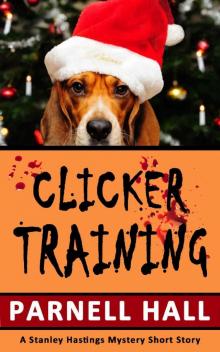 Clicker Training
Clicker Training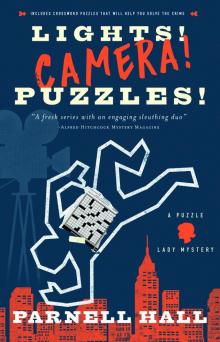 Lights! Camera! Puzzles!
Lights! Camera! Puzzles!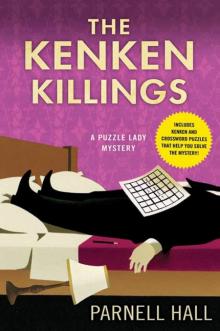 The KenKen Killings
The KenKen Killings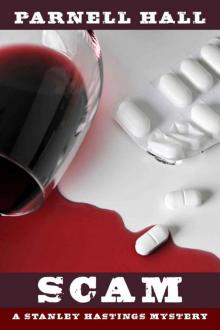 12-Scam
12-Scam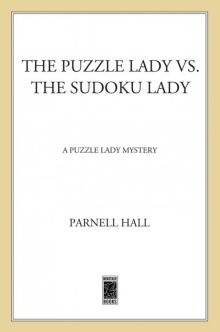 The Puzzle Lady vs. the Sudoku Lady
The Puzzle Lady vs. the Sudoku Lady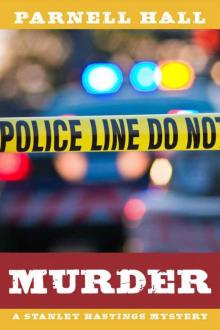 2 Murder
2 Murder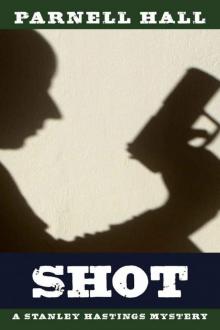 7 Shot
7 Shot You Have the Right to Remain Puzzled
You Have the Right to Remain Puzzled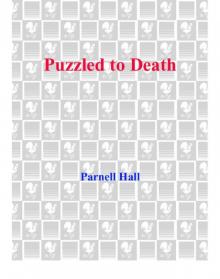 Puzzled to Death
Puzzled to Death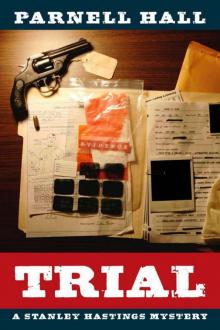 11-Trial
11-Trial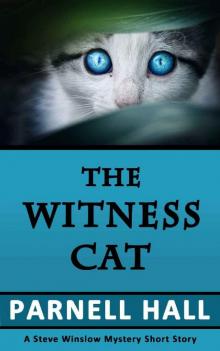 The Witness Cat (Steve Winslow Mystery)
The Witness Cat (Steve Winslow Mystery)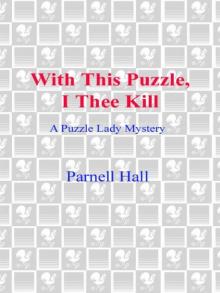 With This Puzzle, I Thee Kill
With This Puzzle, I Thee Kill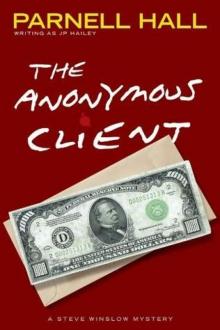 The Anonymous Client sw-2
The Anonymous Client sw-2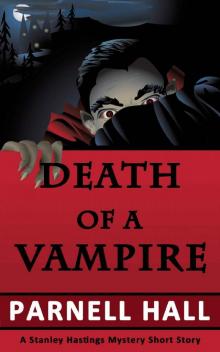 Death of a Vampire (Stanley Hastings Mystery, A Short Story)
Death of a Vampire (Stanley Hastings Mystery, A Short Story)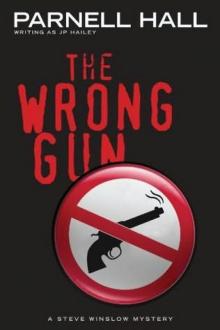 The Wrong Gun sw-5
The Wrong Gun sw-5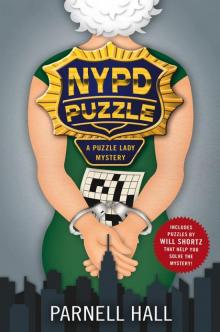 NYPD Puzzle
NYPD Puzzle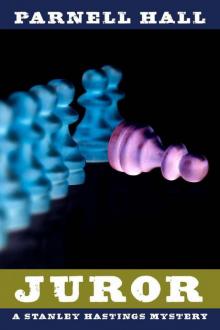 6 Juror
6 Juror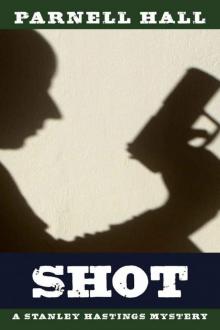 07-Shot
07-Shot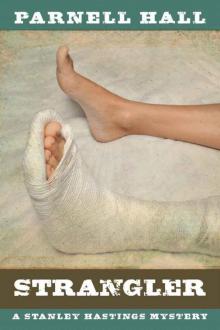 04-Strangler
04-Strangler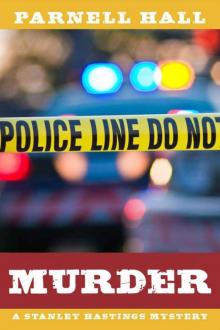 02-Murder
02-Murder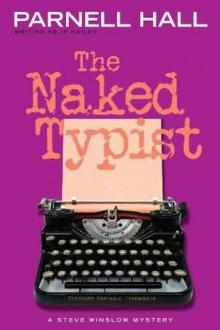 SW04 - The Naked Typist
SW04 - The Naked Typist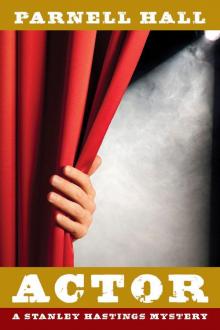 Actor
Actor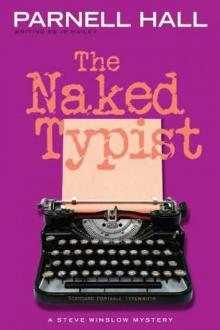 The Naked Typist sw-4
The Naked Typist sw-4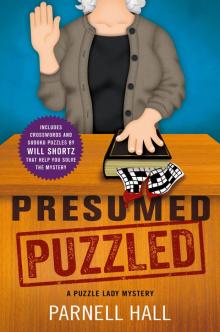 Presumed Puzzled
Presumed Puzzled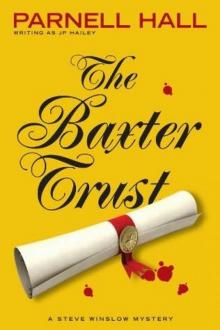 SW01 - The Baxter Trust
SW01 - The Baxter Trust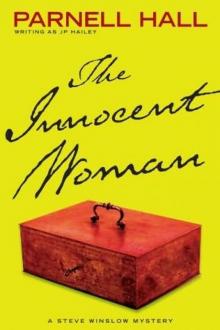 SW06 - The Innocent Woman
SW06 - The Innocent Woman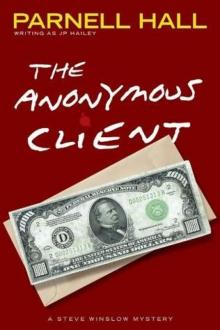 SW02 - The Anonymous Client
SW02 - The Anonymous Client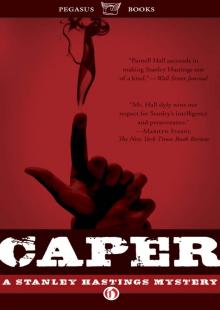 Caper
Caper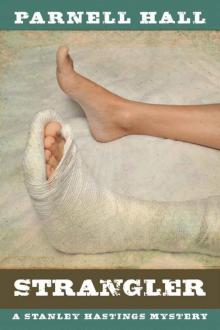 4 Strangler
4 Strangler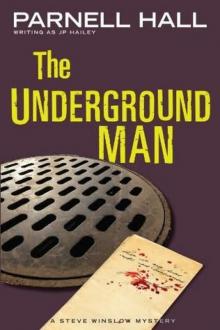 The Underground Man sw-3
The Underground Man sw-3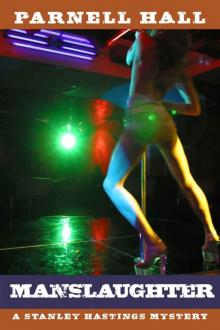 Manslaughter (Stanley Hastings Mystery, #15)
Manslaughter (Stanley Hastings Mystery, #15)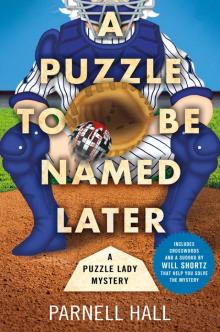 A Puzzle to Be Named Later--A Puzzle Lady Mystery
A Puzzle to Be Named Later--A Puzzle Lady Mystery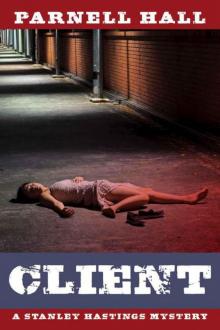 05-Client
05-Client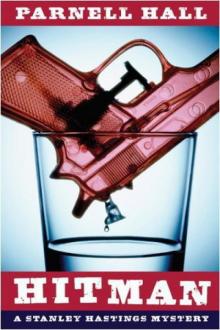 16 Hitman
16 Hitman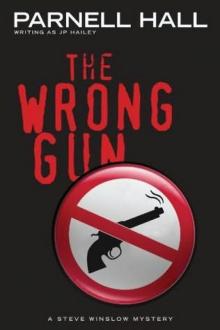 SW05 - The Wrong Gun
SW05 - The Wrong Gun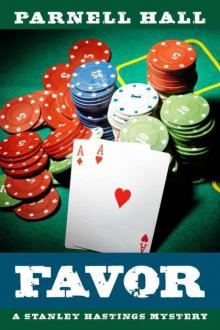 3 Favor
3 Favor Last Puzzle & Testament
Last Puzzle & Testament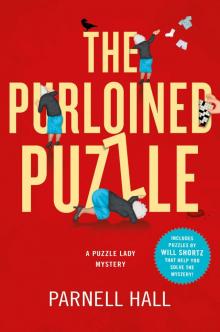 The Purloined Puzzle
The Purloined Puzzle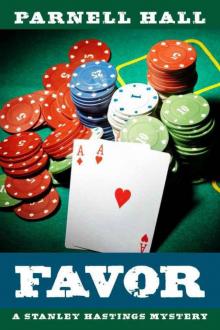 03-Favor
03-Favor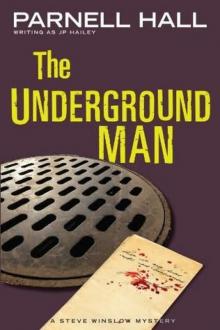 SW03 -The Underground Man
SW03 -The Underground Man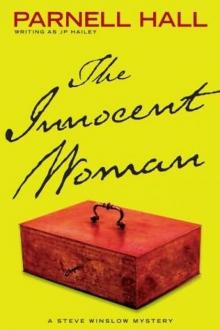 The Innocent Woman sw-6
The Innocent Woman sw-6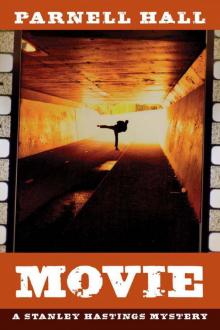 10 Movie
10 Movie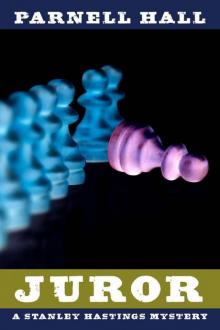 06-Juror
06-Juror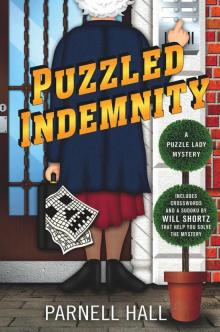 Puzzled Indemnity
Puzzled Indemnity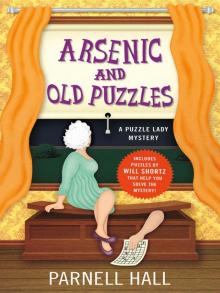 Arsenic and Old Puzzles
Arsenic and Old Puzzles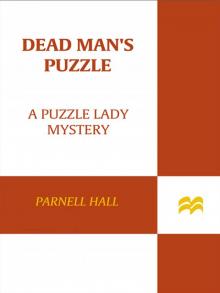 Dead Man's Puzzle
Dead Man's Puzzle Safari
Safari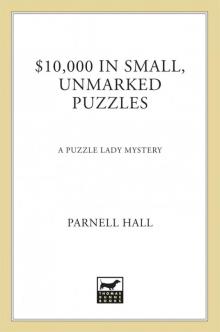 $10,000 in Small, Unmarked Puzzles
$10,000 in Small, Unmarked Puzzles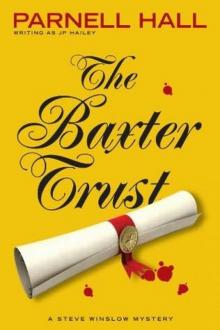 The Baxter Trust sw-1
The Baxter Trust sw-1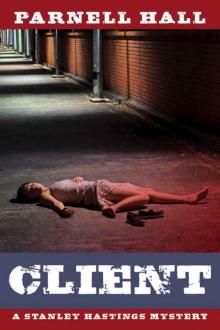 5 Client
5 Client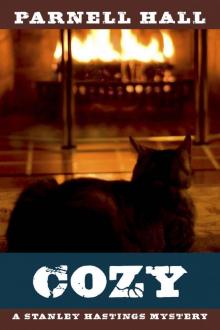 Cozy (Stanley Hastings Mystery, #14)
Cozy (Stanley Hastings Mystery, #14)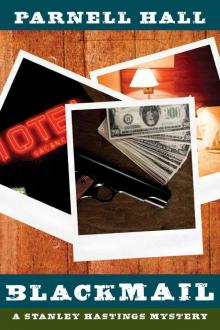 Blackmail
Blackmail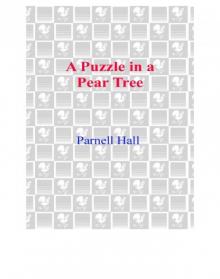 A Puzzle in a Pear Tree
A Puzzle in a Pear Tree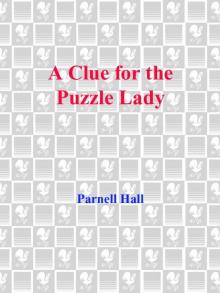 A Clue for the Puzzle Lady
A Clue for the Puzzle Lady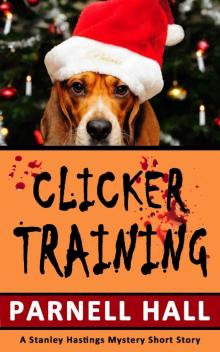 Clicker Training (Stanley Hastings Mystery, A Short Story)
Clicker Training (Stanley Hastings Mystery, A Short Story)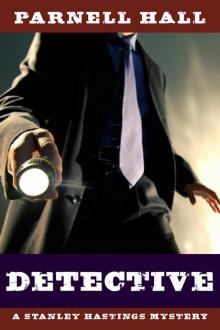 Detective (Stanley Hastings Mystery Book 1)
Detective (Stanley Hastings Mystery Book 1)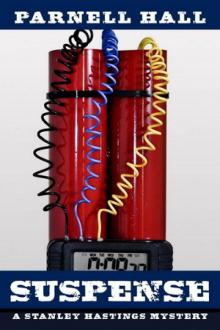 13 Suspense
13 Suspense